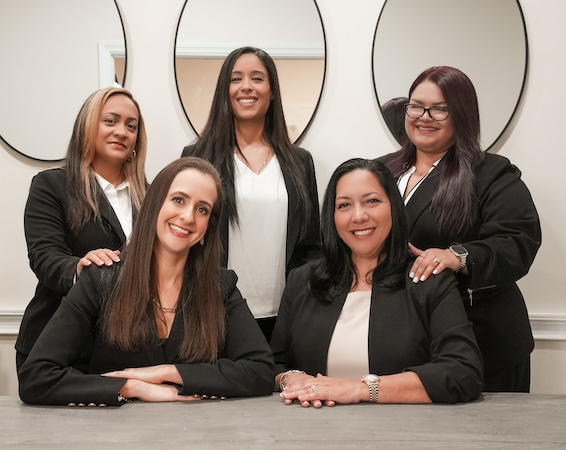All Areas of Family Law
and Divorce
Hablamos Español

For a Phone Consultation





Family law issues not only present legal challenges but also can take an emotional toll on a family. Whether you are going through a divorce, facing a paternity issue, or trying to resolve a dispute over your children or your property, we can provide sensitive, ethical, and cost-efficient representation. At the Law Offices of Carmen G. Soto, we are familiar with all of the complexities and nuances that can arise in a family law matter in Broward County. We recognize how much may be at stake for the spouses and potentially their children, and we are committed to finding a solution that will protect your interests and further your goals. We offer flexible payment plans, and our staff speaks Spanish. Put Carmen Soto’s 23 years of experience to work for you by contacting us today.
A divorce is defined as a legal action filed by a married person or persons to end a marriage. When it comes to divorce, Florida is a “no fault” state, which means that a court will not need to assign “fault” to either spouse in the divorce. Instead, a divorce can be sought simply because the marriage is irretrievably broken, such that the spouses are not expected to reconcile. To seek a divorce in Florida, one of the spouses must have been a Florida resident for at least six months prior to filing the divorce petition. Our divorce attorney can help Fort Lauderdale residents and other people throughout Broward County complete the necessary procedures for dissolving their marriage. While the process may seem simple at first glance, an attorney can make sure that none of the technicalities is overlooked and that you understand all of the legal implications.
What was traditionally known as child custody and visitation is now known as “timesharing” in Florida. For many parents, this is the hardest part of a divorce. If they have minor children, they will need to make arrangements with respect to “timesharing” (formerly physical custody) and “parental responsibility” (formerly legal custody). Timesharing refers to the time that the child will spend with each parent, including holidays and vacations. Parental responsibility, on the other hand, refers to who will make decisions about significant aspects of the child’s life, such as religion, education, and medical care. The parents are free to agree on an arrangement when it comes to these issues. However, if the parents cannot agree, the court will make a decision based on what is in the best interest of the child.
Parents have a legal responsibility to financially support their children. In Florida, child support is based on a mathematical formula set forth in Florida Statute 61.30. The calculation examines each parent’s net income, costs for the children (such as daycare, medical insurance, education costs, and any costs associated with special needs), and the number of overnights that each parent spends with the children. Child support obligations last until the child turns 18 years of age or graduates from high school, whichever is later. Fort Lauderdale divorce attorney Carmen Soto can advocate for your right to receive child support if you are the recipient or make sure that you are not unfairly burdened with excessive payments if you are the payer.
Alimony, sometimes known as spousal support, is the financial assistance provided by one spouse to the other after a divorce. In Florida, either the husband or the wife may be entitled to receive alimony, depending on the circumstances. One of the most important factors in an alimony determination is how long you were married. The longer that a couple has been married, the more likely it is that one spouse will receive alimony in the event of a divorce. When making an alimony determination, the court will examine a number of factors, including the length of the marriage, the standard of living established during the marriage, the age and health of each spouse, the education level and earning potential of each spouse, and the contribution of each spouse to the marriage, including any homemaking services rendered.
Florida is an “equitable distribution” state, which means that marital property will be divided fairly at the time of the divorce. There may be certain situations in which a court decides to order a division of marital assets that is not exactly even, although a 50/50 division is most common. Marital property typically includes assets and debts acquired over the course of a marriage. Separate or non-marital property, on the other hand, is not subject to division at the time of the divorce. It includes assets and debts that a couple defines as separate in a valid written agreement (such as a prenuptial agreement), income from separate property, and inheritances or gifts from outside the marriage to one spouse that are kept separate from marital property. Property division can quickly become complicated because there may be many assets and debts to divide, which is why having an experienced divorce lawyer in the Fort Lauderdale area on your side is critical in these cases.
Under Florida law, a stepparent adoption allows a married stepparent to adopt his or her spouse’s child. When a stepparent adoption is successfully completed, the adoptive parent has the same rights and obligations toward the child that a birth parent would have. A stepparent adoption starts with the stepparent filing an adoption petition in the Circuit Court of the county in which you live. Once the petition is filed, the absent parent has the option to contest the adoption. If the absent parent does not contest the adoption, the court moves ahead and confirms the adoption in favor of the stepparent. If the other parent contests the adoption, however, the process becomes more complicated.
In Florida, a court may require the spouses to go through mediation as a way to resolve issues in their divorce. Fort Lauderdale divorce lawyer Carmen Soto can advise you on what to expect during this process and on the pros and cons of reaching an agreement during mediation instead of going to court. Mediation is the process in which a neutral third-party mediator facilitates negotiation and communication between the spouses regarding important matters, such as property division and alimony. Mediation is often favored because it is less contentious, less expensive, and less time-consuming.
If you are dealing with a family law issue, you should not hesitate to seek guidance from an attorney who knows what you are going through. We understand that retaining legal representation can sometimes create a financial burden, which is why we offer flexible payment plans tailored to each client’s circumstances. Our offices are located close to the Broward County courthouse, which means that we can save our clients travel costs and parking fees. We represent people in Fort Lauderdale, Pembroke Pines, Hollywood, Miramar, Coral Springs, Pompano Beach, Davie, Plantation, Sunrise, Lauderhill, Weston, Tamarac, Margate, Hallandale Beach, Lauderdale Lakes, and other cities in Broward County. To speak to us about your case, call us at 954-523-0703 or contact us online.
Most people feel more comfortable hiring an attorney that has an office near where they live. But did you know that this will cost you money? Lots of money.

Law Enforcement
First Responders
Military
Veterans
Teachers
We Appreciate You!


Call: 954-523-0703

The Law Office of Carmen G. Soto was featured in Oprah Magazine in January 2019. The article highlighted the passion that Attorney Soto brings to her work, which she views as a calling rather than just a job. Attorney Soto explained that she prioritizes the best interests of any children involved in a divorce.
Carmen G. Soto, PA and her amazing legal team is Excellent!!!! represented my daughter during divorse and we would absolutely recommend her!! Thank you and GOD BLESS YOU!!
Carmen G. Soto, is an excellent attorney. She is very patient, knowledgeable, professional and my favorite.... flexible with payment plans. I was in need of an attorney to secure my sons future, and Carmen with her knowledge and experience provided the support we needed. I can honestly say that as a...
Never having to use an attorney before, I was quite nervous and skeptical about my first meeting. Carmen Soto, not only made my first experience very comfortable, but was very informative and quite knowledgable in the field of family law and divorce. She was there every step of the way for me as a...
